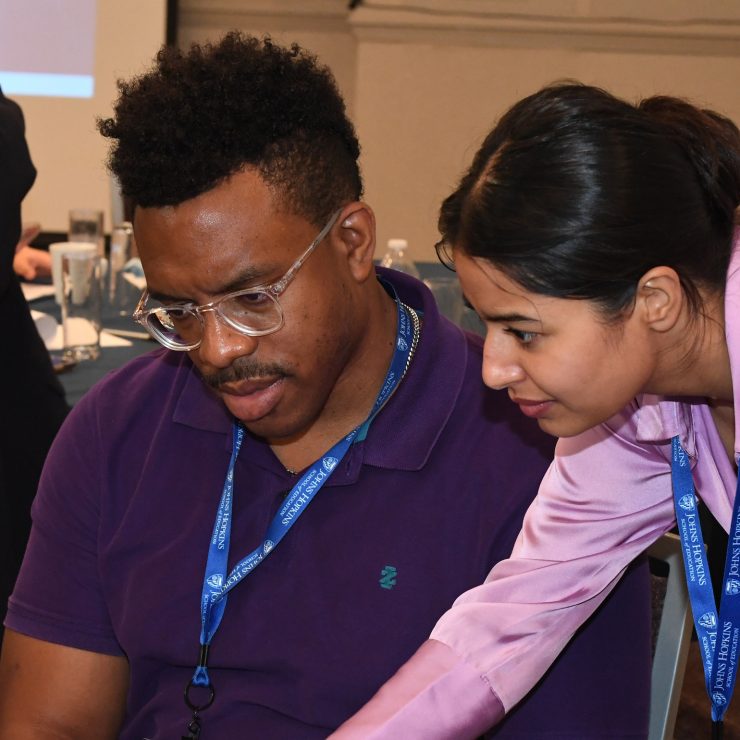Johns Hopkins’ newly redesigned, global online Doctor of Education is at the forefront of education doctoral programs with the most innovative, challenging, and student-centered program of its kind.
Celebrating its 10th anniversary, the program continues to lead with the “EdD 2.0” offering, which is ideal for the busy education practitioner within any professional context. Our program recognizes that learning is both lifelong and occurs outside of formal schooling.
The vision of the Johns Hopkins EdD program is to prepare education-practitioners across the country and around the world to think critically about problems within their education environment and develop the insights and capacity to lead positive, sustained change.
Questions? Please reach out and we’ll be in touch soon.
Upcoming Admissions Events
Have questions about our degree programs, the application, or financial aid and costs? Join us for an inside look at a graduate experience defined by innovation and driven by evidence-based research. Learn more about your area of interest or career path, meet some of our faculty, and connect to the Johns Hopkins School of Education community. Check out our admissions events and register for a virtual information session today.

No Events at this time.

No Events at this time.
Core Faculty
-
Yolanda Abel, EdD
Associate Professor
Affiliation
Advanced Studies in Education
Expertise
Administration, Organization & Leadership, Education Policy & Politics, Social Context of Education

-
Camille Bryant, PhD
Associate Professor
Affiliation
Advanced Studies in Education

-
Joshua Travis Brown, PhD
Assistant Professor
Affiliation
Advanced Studies in Education
-
Marcia Davis, PhD
Associate Professor (Research)
Co-Director, Center for Social Organization of Schools
Director of Research, Baltimore Education Research ConsortiumAffiliation
Center for Social Organization of Schools, SOE Leadership
Expertise
Learning & Instruction, Research, Evaluation & Assessment

Yolanda Abel, EdD
Associate Professor
Affiliation
Advanced Studies in Education
Expertise
Administration, Organization & Leadership, Education Policy & Politics, Social Context of Education

Camille Bryant, PhD
Associate Professor
Affiliation
Advanced Studies in Education

Joshua Travis Brown, PhD
Assistant Professor
Affiliation
Advanced Studies in Education
Marcia Davis, PhD
Associate Professor (Research)
Co-Director, Center for Social Organization of Schools
Director of Research, Baltimore Education Research Consortium
Affiliation
Center for Social Organization of Schools, SOE Leadership
Expertise
Learning & Instruction, Research, Evaluation & Assessment

-
Christine Eith, PhD
Assistant Professor
Affiliation
Advanced Studies in Education

-
Keri Guilbault, EdD
Associate Professor
Affiliation
Counseling & Educational Studies
Expertise
Gifted Education, Learning & Instruction

-
Ranjini Mahinda JohnBull, PhD
Assistant Professor
Affiliation
Advanced Studies in Education
Expertise
Learning & Instruction, Mind, Brain, & Teaching

-
Olivia Marcucci, PhD
Assistant Professor
Affiliation
Advanced Studies in Education, Center for Safe and Healthy Schools
Expertise
Social Context of Education

Christine Eith, PhD
Assistant Professor
Affiliation
Advanced Studies in Education

Keri Guilbault, EdD
Associate Professor
Affiliation
Counseling & Educational Studies
Expertise
Gifted Education, Learning & Instruction

Ranjini Mahinda JohnBull, PhD
Assistant Professor
Affiliation
Advanced Studies in Education
Expertise
Learning & Instruction, Mind, Brain, & Teaching

Olivia Marcucci, PhD
Assistant Professor
Affiliation
Advanced Studies in Education, Center for Safe and Healthy Schools
Expertise
Social Context of Education

-
James Diamond, PhD
Assistant Professor
Affiliation
Counseling & Educational Studies
Expertise
Educational Technology, Learning & Instruction

-
Wendy Osefo, PhD
Assistant Professor
Affiliation
Advanced Studies in Education
-
E. Juliana Pare-Blagoev, EdD
Associate Professor
Affiliation
Counseling & Educational Studies

-
Eric Rice, PhD
Assistant Professor
Affiliation
Counseling & Educational Studies
Expertise
Social Context of Education, Urban Education

James Diamond, PhD
Assistant Professor
Affiliation
Counseling & Educational Studies
Expertise
Educational Technology, Learning & Instruction

Wendy Osefo, PhD
Assistant Professor
Affiliation
Advanced Studies in Education
E. Juliana Pare-Blagoev, EdD
Associate Professor
Affiliation
Counseling & Educational Studies

Eric Rice, PhD
Assistant Professor
Affiliation
Counseling & Educational Studies
Expertise
Social Context of Education, Urban Education

-
Laura Flores Shaw, EdD
Assistant Professor
Faculty Lead, Doctor of EducationAffiliation
Advanced Studies in Education
Expertise
Learning & Instruction
-
Henry M. Smith, EdD
Assistant Professor
Affiliation
Advanced Studies in Education
Expertise
Administration, Organization & Leadership, Education Policy & Politics

Laura Flores Shaw, EdD
Assistant Professor
Faculty Lead, Doctor of Education
Affiliation
Advanced Studies in Education
Expertise
Learning & Instruction
Henry M. Smith, EdD
Assistant Professor
Affiliation
Advanced Studies in Education
Expertise
Administration, Organization & Leadership, Education Policy & Politics

Program Overview
Exceptional education-practitioners will engage with an internationally renowned faculty to cultivate and practice curiosity, critical discourse, and perspective taking in a unique and rigorous course of study using the lenses of social justice, systems thinking, appropriate research methods, and empirical inquiry.
Coursework includes the latest research on the social determinants of education; mind, brain, and teaching; entrepreneurship; data and measurement; and technology. The redesigned program allows our doctoral students to customize their program by expanding their choice of electives so that they may focus more deeply on their professional interests that align with their problem of practice. Our online EdD prepares education practitioners to be transformational leaders within their professional settings.
The vision of the Johns Hopkins EdD program is to impact complex educational problems across the globe by preparing education practitioners to think critically and systemically about problems within their professional settings and develop deep understanding and insights to lead positive, sustained change within those settings.Our graduates create new areas of research, promote distribution and utilization of research findings in professional practice, and contribute to wider public discourse and policy.
Areas of Interest
The EdD program includes areas of interest. Applicants can indicate one or more areas of interest they think are related to a problem of practice and would like to explore. Current areas of interest are:
- Creativity, Advanced Learning, and Twice Exceptionality
- Digital Age Learning and Educational Technology
- Entrepreneurial Leadership in Education
- Mind, Brain, and Teaching
- Urban Leadership
Creativity, Advanced Learning, and Twice Exceptionality
Courses in this area of interest are designed to prepare candidates for leadership roles in advanced academics and gifted education with an emphasis on research and application of current best practices in the field. Based on the National Association for Gifted Children (NAGC) and Council for Exceptional Children (CEC) Advanced Standards in Gifted Education Teacher Training, candidates will develop specialization in leading and evaluating programs and services for students who are creative, advanced, gifted, and twice exceptional. This area of interest is appropriate for candidates who: (a) want to deepen their expertise and prepare for leadership roles in their school, district, or state; (b) work in related nonprofit organizations, independent schools, or plan to develop their own educational enrichment programs; and (c) aspire to move into teacher preparation and research roles.
Available Courses:
- Twice Exceptional Learners
- Creativity in Education
- Seminar I in Gifted and Talented Education
- Leadership of Gifted Education and Talent Development Programs
- Seminar II in Gifted Education and Talent Development Programs
- Research in Gifted Education, Creativity, and Twice Exceptionalities
Digital Age Learning and Educational Technology
The Digital Age Learning and Educational Technology area of interest in the EdD program provides students opportunities to take courses in educational communication and technology. Select courses are available from the School of Education’s Digital Age Learning and Educational Technology (DALET) master’s degree program. This program prepares aspiring and practicing professionals and entrepreneurs in the field of educational communication and technology to design, develop, implement, and evaluate digital technology-supported tools and environments for learning across the lifespan in a variety of formal and informal settings, including pre-K–12, higher education, industry, government, and museums.
Available Courses:
- Computational Thinking for K-12 Educators
- Explorations in Blended and Hybrid Learning
- Foundations of Online Teaching and Learning
- Fundamentals of Design Thinking
- Gaming and Simulations for Learning
- Instructional Design for Online Learning
- Maker Education: Cultivating Curiosity, Creativity, and Problem Solving in Theory and Practice
- Technology for Learner Variability
- Technology Integration for the 21st Century Learner
- Technology and the Science of Learning
Entrepreneurial Leadership in Education
Entrepreneurial Leadership in Education offers a unique opportunity for school and other educational organization leaders in both public and private educational environments. Students develop their knowledge, skills, and dispositions as they engage in leading efforts to build new venture opportunities in varied educational organizations. Through multidisciplinary lenses, educational leaders promote innovation in the paradigms, strategies, values and culture in school systems, social entrepreneurial ventures, and education companies. Each of the courses offers an opportunity to explore leadership theoretical frameworks, identify a Problem of Practice, and create a plan of action, through analysis and synthesis of presentations, readings, and discussion of the current state of multiple educational environments and the visions and challenges for the future.
Available Courses:
- Entrepreneurship in Education
- Talent Management and Organizational Finance for Entrepreneurial Leaders
- Data Driven Decision Making
- Partnerships and Educational Organizations
Mind, Brain, and Teaching
Mind, Brain, and Teaching is designed for educators interested in exploring research from cognitive theories and neurosciences and its potential to inform the education field. Courses promote integration of diverse disciplines that investigate human learning and development. This area of interest builds upon basic and applied research from the fields of cognitive science, psychology and brain sciences, neurology, neuroscience, and education. It provides educators with knowledge of how emerging research in the learning sciences can inform teaching and learning. Students gain the knowledge and skills to interpret basic and applied research and apply relevant findings to educational practices and policies. This area of interest is designed to support the development of knowledge, insights, and competencies among students with two different levels of prior knowledge in the learning sciences: those who have had limited formal exposure to the learning sciences, and those who have a master’s degree or master’s certificate in the learning sciences.
Available Courses:
- Fundamentals of Cognitive Development
- Neurobiology of Learning Differences
- Cognitive Processes of Literacy and Numeracy
- Special Topics in Brain Sciences
Urban Leadership
Cities are usually characterized by diverse populations with rich communities made up of many different races, classes, languages, and nationalities, and this dynamism is a chief strength of urban areas. However, urban schools typically serve populations characterized by high concentrations of poverty and therefore face difficult choices about how to allocate scarce resources. Urban Leadership is designed for educational professionals interested in exploring this dual nature of urban schools through a deep understanding of a Problem of Practice based in their unique context of professional practice. This area of interest prepares educational leaders to work in urban environments through a focus on topics such as building a strength-based understanding of the complexities of urban communities, engaging the latest research on urban educational programs, developing strategies for program improvement, and building partnerships with families, communities, and other organizations.
Available Courses:
- Approaches to Urban Education
- Individuals in Urban Context
- Organizations and Institutions
- Partnerships and Community Organizing
After SOE
Graduates from our EdD program work in diverse areas, including executive roles in educational organizations and start-ups, leadership in K-12 school districts and systems, consultancy in specialized education fields, and more.
Careers
- Administrator
- Superintendent
- Instructional Designer
- Chief Learning Officer
100% Online
Continue your full-time career and apply what you learn in real time as you earn your degree 100% online.
Careers
- Administrator
- Superintendent
- Instructional Designer
- Chief Learning Officer
100% Online
Continue your full-time career and apply what you learn in real time as you earn your degree 100% online.
Legal Disclosure
State-Specific Information for Online Students
Students should be aware of additional state-specific information for online programs. Johns Hopkins University is a member of the Carnegie Project on the Education Doctorate, which is the knowledge forum on the EdD. It has a membership of over 100 schools of education in the U.S., Canada, and New Zealand working collaboratively to improve professional preparation in education at the highest level.
